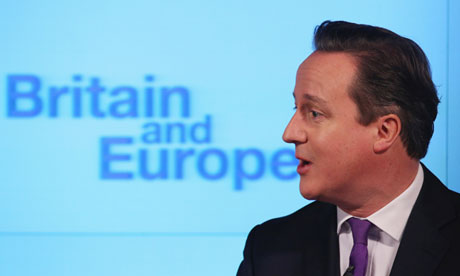In this post, I offer my analysis of Cameron’s speech on Europe by looking at the two underlying dimensions: communication and politics.
Read about the background to the speech here.
Let us try to draw a comparison with the US. There is a very clear distinction between the tone and use of language compared to President Obama’s speeches: metaphors are rarely used, the pathos and the eye-watering moments are virtually nonexistent. The speech doesn’t necessarily talk to or level with the “folk”, but rather takes the pedestal of authority and somehow conveys a feeling of caring for the nation from higher ground. Gone are the lengthy allegories which go on for 5 minutes before stating a point of policy in one sentence at the very end. The language is fluid, simple and straight to the point, and the text is filled to the brim with policy suggestions. It is almost like a press release. Of course, a speech is a speech, and words such as “positive”, “committed” and “active” are omnipresent and Cameron does very well in raising his voice where it matters while trying his best to walk the fine line between appeasing a domestic public (and party) and avoiding any further alienation of his strategic partners on the continent. In fact, the speech was so ‘British’, it reminded me of an old quote they used to teach us in history class about the mindset of British foreign relations: “We have no eternal allies and no perpetual enemies – our interests are eternal and those interests it is our duty to follow.” – Palmerston.
This simple, age-old approach to international relations literally flows from the very concept of renegotiating Britain’s position in the EU and promising and in/out referendum. It seems to have guided the hand of the Prime Minister the way it has guided his anti-immigration rhetoric in the months following his Europe speech. But what if there is more to that than simply following a good tradition?
In the grand scheme of politics, what truly matters is being in power – that is every party or politician’s ultimate agenda. So let us take a step backwards and try to view this whole ordeal with political strategy in mind: It is mid-term, tensions in the governing coalition are ramping up, there is enormous internal pressure from Tories to change course on Europe, the Eurozone crisis seems to be only deepening with no end in sight, Conservative poll results are down 5% in 2 years, and Labour is up by 7%. Now let’s think what a crisis manager would tell us in a situation like this? “Contain it before it develops into a crisis.” That is why we should not discard the possibility that the speech aims to electrify the Conservative and rightist electorates and attempt to draw from a growing euro-skeptic pool of voters currently cajoled by the UK Independence Party. What is more, in his speech, Cameron promises to organise an in/out referendum only if the Conservative party is voted into power during the next election, and that effectively makes it a part of the Conservative party’s election platform. And yes, there is no shame in thinking or admitting that. Any chance to energise voters pre-election is fair game. Politics is a multifaceted game and every move, especially if it challenges the status quo, is carefully calculated.
Cameron’s speech is certainly not all about poll results, dealing with internal pressure, or trying to increase his party’s chances for success at the next election – it is an excellent, distinctly British speech with some very strong points of policy backed by solid reasoning and great oratory skills. But let us not forget that not everything is what it seems at first glance and while communication professionals can shape words into beautiful form and party officials are the ones that set the ultimate agenda, it is their collaboration that wins elections.

